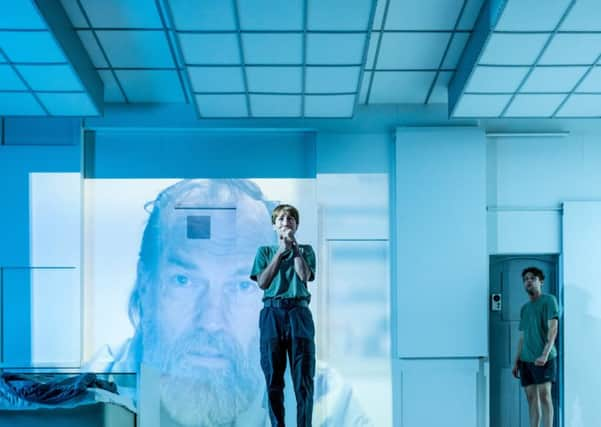Theatre review: Solaris, Lyceum Theatre, Edinburgh


Solaris, Lyceum Theatre, Edinburgh ****
This is the beginning of the Polish writer Stanislaw Lem’s great science-fiction story Solaris, immortalised in Andrei Tarkovsky’s mighty 1972 film; and also of David Greig’s new Lyceum stage version, co-produced with the Malthouse, Melbourne. For Lem and Tarkovsky, of course, the scientist was always male, the lost lover female; but the gender shift is only one of the many aspects of this 21st-century version that works beautifully, as Greig and director Matthew Lutton lead us into the strange world of a spaceship which is also home to two remaining crew members, Snow and Sartorius, and to videotapes offering the last insights of the ship’s late captain, Gibarian – tapes which raise profound questions about the nature of Solaris and its apparent power to create images and “visitors” from the crew’s memories.
There are a few issues in this staging that slightly reduce its power. The constant rising and falling of the deep black shutter begins as a powerful image of fragmentation and disorientation, but soon becomes a shade distracting, as a way of dealing with scene-changes; and the filmic mood it creates sometimes affects the performances, to the point where the actors’ murmured words become inaudible.
Advertisement
Hide AdNone of this, though, cancels the power of the story itself, or the shimmering strangeness of the presence of Solaris as evoked by Paul Jackson’s lighting, or the intense emotional force of the show’s three central performances, from a clever and sympathetic Polly Frame as Kris, a wonderfully bewildered Keegan Joyce as Ray and a breathtakingly powerful Hugo Weaving, on video, as Gibarian. The words “artificial intelligence” are never mentioned. Yet by the end we are faced with profound and challenging questions about how human beings interact with non-human creatures made in our image, from our own memories and dreams; and also about whether we approach our utterly unknown future in a spirit of fear and hostility or with the love, joy, wonder and curiosity finally embraced by Kris, in the show’s chilling, thrilling and mind-blowing closing moments. Joyce McMillan
Until 5 October